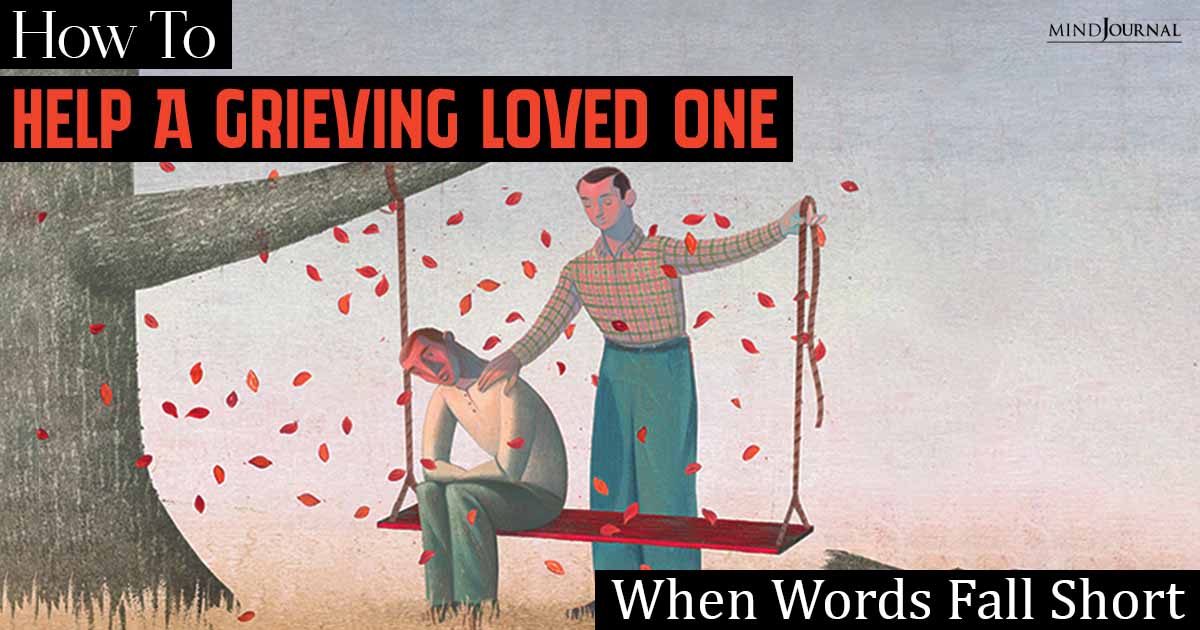When you see someone you love grieving, it can hit hard, and might even make you feel helpless. If your intention is to support a grieving loved one, then you have come to the right place. This article is going to talk about how to help a grieving loved one, and helping someone who is grieving.
KEY POINTS
- It’s natural to want to make a grieving loved one “feel better,” but the task should be to help them feel less isolated.
- Some well-meaning statements can cause feelings of isolation for those experiencing grief.
- It’s important to show grieving loved ones caring, presence, and patience.
When someone close to you is experiencing grief, it’s natural to want to jump in and fix it for them. Watching someone suffer brings up discomfort in ourselves. You just want to make it better for them, make the suffering go away.
You might avoid talking about the subject of their grief, for fear of not knowing what to say. You might be compelled to tell them something like, “You have an angel in heaven, now,” or “It’s time to move on. Try and stay busy.”
But, when you look at this avoidance and these statements carefully, you can see the real message behind them; a well-intentioned response can send the message to a grieving person, “You shouldn’t be feeling this way” or “Your grief makes me uncomfortable, so cut it out.”
Related: 5 Ways To Help Someone Who Is Dealing With Loss And Grief
How To Help A Grieving Loved One?
It is hard for us to accept that there are things in this world that are terribly painful—things that happen to us and our loved ones that we can’t control and are truly unfair. The hard truth is that we will all experience tragedy. With loss, we experience grief.
Sadness is a natural response to losing something that we care about or that gave us a sense of safety. So, when talking to someone who is grieving, don’t try to fix their pain. It won’t work, and it will make them feel even more alone. Their grief just needs to live in them for a while, no matter how painful it may be for them and for you.
Many experts agree that trying to push grief away is actually a cause of depression; fully experiencing grief is the only way for it to pass and make meaning of the loss.
Your task is not to make a grieving person feel better, but less isolated in their experience. Be with them. This person may feel that they are in a sinking boat. Get in the boat and sink with them so they have company.
Try saying something like, “It’s OK not to be OK,” “You can cry with me; I am here,” “Tell me about them. I want to hear everything,” or, “Sometimes with grief there are no words. I can just sit here beside you.”
Responses like these acknowledge that grief is a natural human emotion, convey that you accept this person’s experience the way it is, and show them that you are present when they need you.
This is what a grieving person needs to hear. The pain will still be there, but it will be warmed as if you had tended to them with a warm blanket.
Related: 8 Things You Should Never Say To Someone Who Is Grieving
Of course, responding in this way takes a lot of courage on your part: You have to learn to sit in another’s grief and with your own uncertainty. You have to move from the illusion that you can provide a solution to the truth that you can’t do a thing to stop the grief.
This is a challenging job, and yet the only way to truly help. When another’s heart is broken, let them have yours. It’s the hardest thing to do, and it’s all you need to do.
For more on grief, I recommend How to Survive the Loss of a Love
To book an online couples or individual therapy or coaching session with Dr. Tasha Seiter or a skilled therapist or coach on her team (from anywhere in the world), visit their website, call, or email: https://marriage-counseling-fort-collins.com/
(970)335-9190
[email protected] would love to work with you in relationship or individual coaching or therapy!
Written By Dr. Tasha Seiter Originally Appeared On Psychology Today










Leave a Reply